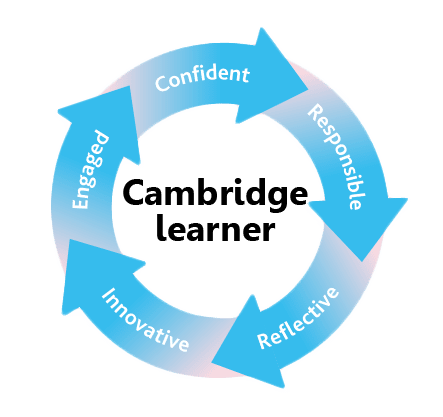Teaching and Learning
What are our aspirations for students when they leave school? This question was the starting point for the development of the Cambridge learner attributes, introduced in 2011. The purpose of these attributes is to support the development of five powerful and highly desirable habits that will inspire students to love learning. This
Learning habits describe how students approach situations, environments
We know that, in isolation, these attributes are not new. Most education professionals see developing them as part of their job. But in setting out the Cambridge learner attributes, we have created a list of desirable outcomes intended to encourage schools to support these habits. They also help us to design challenging and relevant qualifications and professional development programmes.
Learning to learn
Put simply, learning happens when students think hard,
Learning habits matter. ‘Non-cognitive skills’ include personal qualities such as perseverance, self-control, attentiveness, resilience to adversity, openness to experience, empathy
- predict life outcomes at least as well as or better than traditional measures of cognition
- have positive and strong effects on educational attainment and also
additional significant beneficial effects on importantworkplace and life outcomes - can be enhanced, and there are proven and effective ways to do so.
Research shows that engaging students in their own learning – for example, via metacognition and active learning – improves outcomes. As the Cambridge learner attributes suggest, we encourage students to reflect on their learning, so they can articulate where they are in the learning process, and plan and control their learning strategies. The Cambridge learner attributes also provide a cross-curricular language and set of expectations for all students and teachers to engage with.
Metacognition describes the processes involved when learners plan, monitor, evaluate and make changes to their own learning
Cambridge helps schools develop students’ metacognition. Syllabus design is informed by research evidence about metacognition. Cambridge Global Perspectives programmes support learners in the process towards metacognition. Cambridge Professional Development Qualifications encourage and support metacognitive practices in teachers and school leaders.
For Cambridge, active learning fosters understanding, rather than rote learning facts. Students can apply this understanding to diverse contexts and problems. Active learning fosters students’ learning and their autonomy, giving them great involvement and control over their learning and giving them skills for lifelong learning.
Also, learners are better able to revise for examinations, because they already understand the ideas. Cambridge programmes not only develop and assess retention of
Cambridge Learn attributes
Confident in working with information and ideas – their own and those of others
Cambridge students are confident, secure in their knowledge, unwilling to take things for granted and ready to take intellectual risks. They are keen to explore and evaluate ideas and arguments in a structured, critical and analytical way. They are able to communicate and defend views and opinions as well as respect those of others
Responsible for themselves, responsive to and respectful of others
Cambridge students take ownership of their learning, set targets and insist on intellectual integrity. They are collaborative and supportive. They understand that their actions have impacts on others and on the environment. They appreciate the importance of culture, context
Reflective as learners, developing their ability to learn
Cambridge students understand themselves as learners. They are concerned with the processes as well as the products of their learning and develop the awareness and strategies to be lifelong learners.
Innovative and equipped for new and future challenges
Cambridge students welcome new challenges and meet them resourcefully, creatively and imaginatively. They are capable of applying their knowledge and understanding to solve new and unfamiliar problems. They can adapt flexibly to new situations requiring new ways of thinking.
Engaged intellectually and socially, ready to make a difference
Cambridge students are alive with curiosity, embody a spirit of enquiry and want to dig more deeply. They are keen to learn new skills and are receptive to new ideas. They work well independently but also with others. They are equipped to participate constructively in society and the economy – locally, nationally and globally.
Helping teachers improve
The overwhelming body of research finds that the most important factor in improving student outcomes is good teaching. Teaching, and matching the teaching approach to the needs of students, is clearly the responsibility of each school. Different schools work in different contexts, and they know what is best for their students and teachers. An important part of our mission, therefore, is to help schools develop their teachers’ classroom practice.
We believe effective teaching and learning can encompass a variety of approaches. Our professional development is designed to reflect that, so that it can help teachers in a variety of educational contexts improve their performance and practice – and therefore improve student outcomes – throughout their careers.
Teachers and school leaders need to develop their professional thinking and practice continuously. That is why we invest heavily in providing a variety of high-quality, affordable routes for professional development.
We hold over 1000 training events worldwide every year, both face to face and online. Some of these training events focus on exams taken by our students. Other events focus on enriching teachers’ own professional practice, and our popular Cambridge Schools Conferences give teachers a chance to learn from expert educators, test out their ideas with others and build their own professional network.
Through our network of Cambridge Professional Development Centres, we provide schools, leaders and teachers with local access to high quality and affordable Cambridge Professional Development Qualification programmes (Cambridge PDQs). Our suite of Cambridge PDQs creates a professional learning and improvement pathway for teachers and school leaders at different stages in their career. They are based on international best practice and research evidence about the kinds of professional development that have real impact and value.
*The text above has been sourced directly from Cambridge international assessments website.

